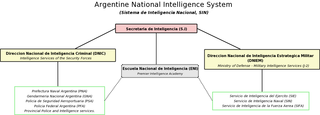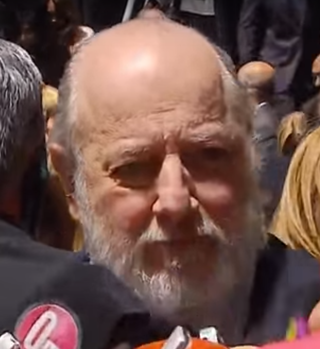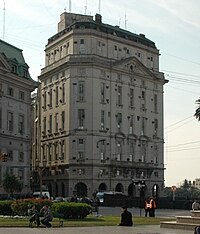
The Brazilian Intelligence Agency is the main intelligence agency in Brazil. ABIN's mission is to ensure that the Federal Executive has access to knowledge related to the security of the State and society, such as those involving foreign defense, foreign relations, internal security, socioeconomic development and scientific-technological development.

The Centro Nacional de Inteligencia or CNI, is a Mexican intelligence agency controlled by the Secretariat of Security and Civilian Protection.

Secretariat of Intelligence was the premier intelligence agency of the Argentine Republic and head of its National Intelligence System.

Sistema de Inteligencia Nacional is the official denomination of the Argentine national intelligence community.
Dirección Nacional de Inteligencia Criminal is an Argentine intelligence agency, part of the National Intelligence System. It used to depend on the Secretaría de Seguridad Interior, which itself depends on the Ministry of Interior; currently, the DNIC depends from the National Ministry of Security. The DNIC is not a division of the Secretaría de Inteligencia (SIDE), which has its own Directorate of Interior Intelligence.
The order of precedence in Argentina is a symbolic hierarchy of officials used to direct protocol. It is regulated by Presidential Decree 2072 of 10 October 1993, signed by then President Carlos Menem, and former ministers Guido di Tella and Carlos Ruckauf.

Law enforcement in Mexico is divided between federal, state, and municipal agencies. There are two federal police forces, 31 state police forces including two for Mexico City, and 1,807 municipal police forces. There are 366 officers per 100,000 people, which equals approximately 500,000 in total.

Amado Boudou is an Argentine economist and politician who served as the Vice President of Argentina from 2011 to 2015. He previously served as Minister of Economy from 2009 to 2011.
The Agencia Nacional de Inteligencia (ANI) is the Chilean government national intelligence agency. Created in 2004, its mission is to coordinate, and advise the President on, intelligence. It is attached administratively to the Ministry of the Interior. Its current director is Gonzalo Yuseff Quiroz. The previous director was Gustavo Villalobos, who was also the last director of Directorate of Public Security and Information. ANI's budget is approximately US$4 million.

The Presidency of Cristina Fernández de Kirchner began on 10 December 2007, when she became President of Argentina. She was an Argentine Senator for the Buenos Aires Province at the time of her victory in the 2007 Presidential election. Cristina Fernández de Kirchner became the second female president of Argentina, and the first one directly elected as such. In elections of November 2015, she was succeeded by Mauricio Macri as President.

Norberto Gustavo Yauhar is an Argentine politician. He was designated Minister of Agriculture by President Cristina Fernández de Kirchner in 2011, serving in the post until 2013.

Natalio Alberto Nisman was an Argentine lawyer who worked as a federal prosecutor, noted for being the chief investigator of the 1994 car bombing of a Jewish center in Buenos Aires, which killed 85 people, the worst terrorist attack in Argentina's history. On 18 January 2015, Nisman was found dead at his home in Buenos Aires, one day before he was scheduled to report on his findings before a Congress inquiry with supposedly incriminating evidence against high-ranking officials of the then-current Argentinian government including former president Cristina Fernández de Kirchner, regarding the Memorandum of understanding between Argentina and Iran.
The Federal Authority for Audiovisual Communication Services was an agency of the government of Argentina with the power to regulate television and radio services. It began activities on December 10, 2009, two months after the passage of the Law 26,522 of Audiovisual Communications Services, and replaced the Federal Broadcasting Committee.
The following lists events that happened in Argentina in 2017.

The National Intelligence Directorate is the main intelligence agency of Colombia. It is the successor organization to the Administrative Department of Security (DAS) which was tasked with providing internal and external intelligence, law enforcement and immigration control. The agency reports solely to the President of Colombia, and is currently led by retired Admiral Rodolfo Amaya.

Claudio Bonadio was an Argentine judge, who was in charge of Federal Criminal and Correctional Court No. 11 since 1994. In that role he intervened in causes of strong impact, some of which involved important government officials and politicians since his appointment, among other causes of high impact on public opinion, including former Presidents of Argentina Fernando de la Rúa, Néstor Kirchner and Cristina Fernández de Kirchner.

The Spanish Agency for the Supervision of Artificial Intelligence is an autonomous agency of the Spanish Department of Digital Transformation responsible for the oversight, counseling, awareness and training regarding the proper use and development of artificial intelligence systems, more specifically, algorithms. In addition, the Agency has also responsibilities of inspection, verification and sanction.














